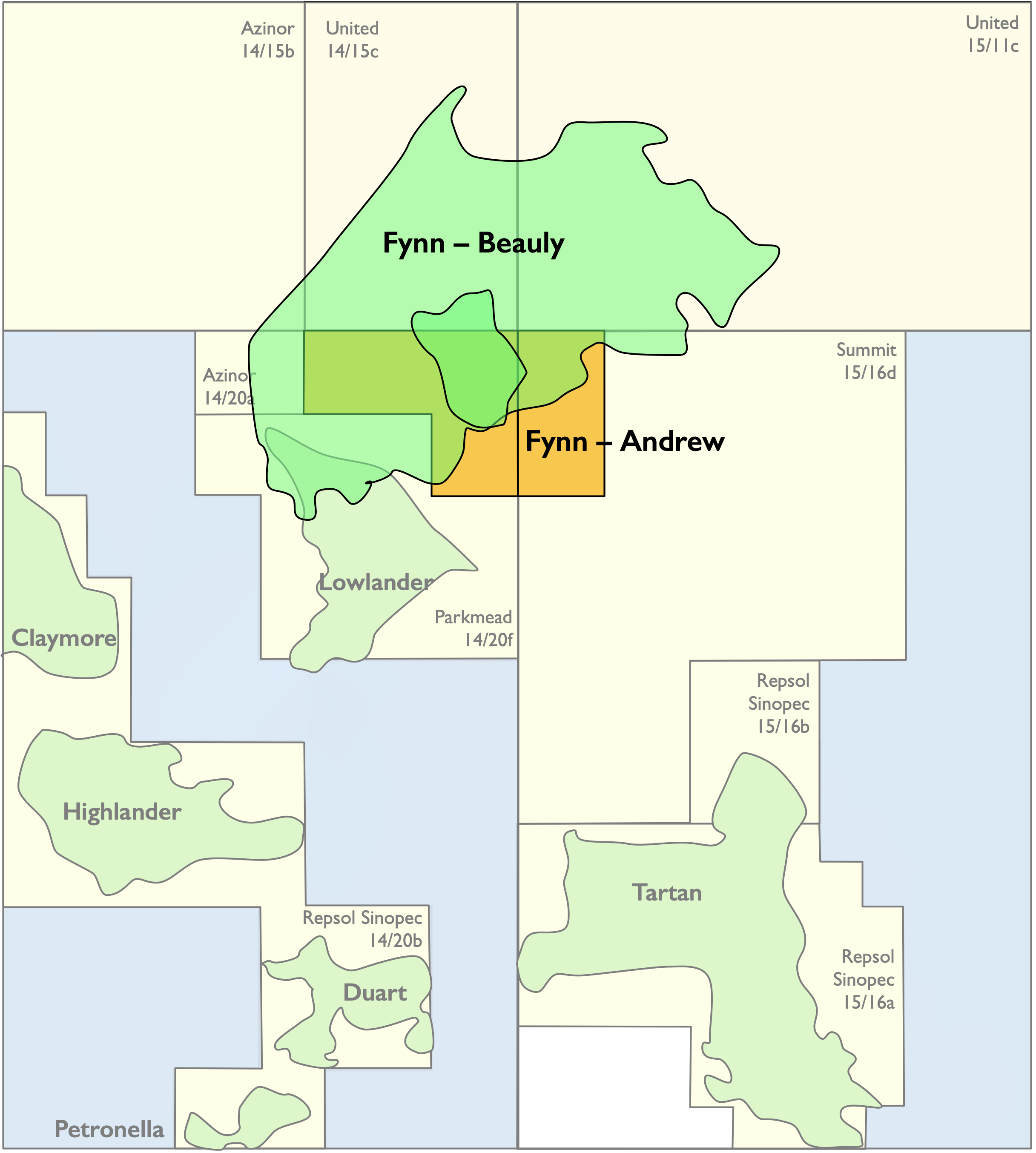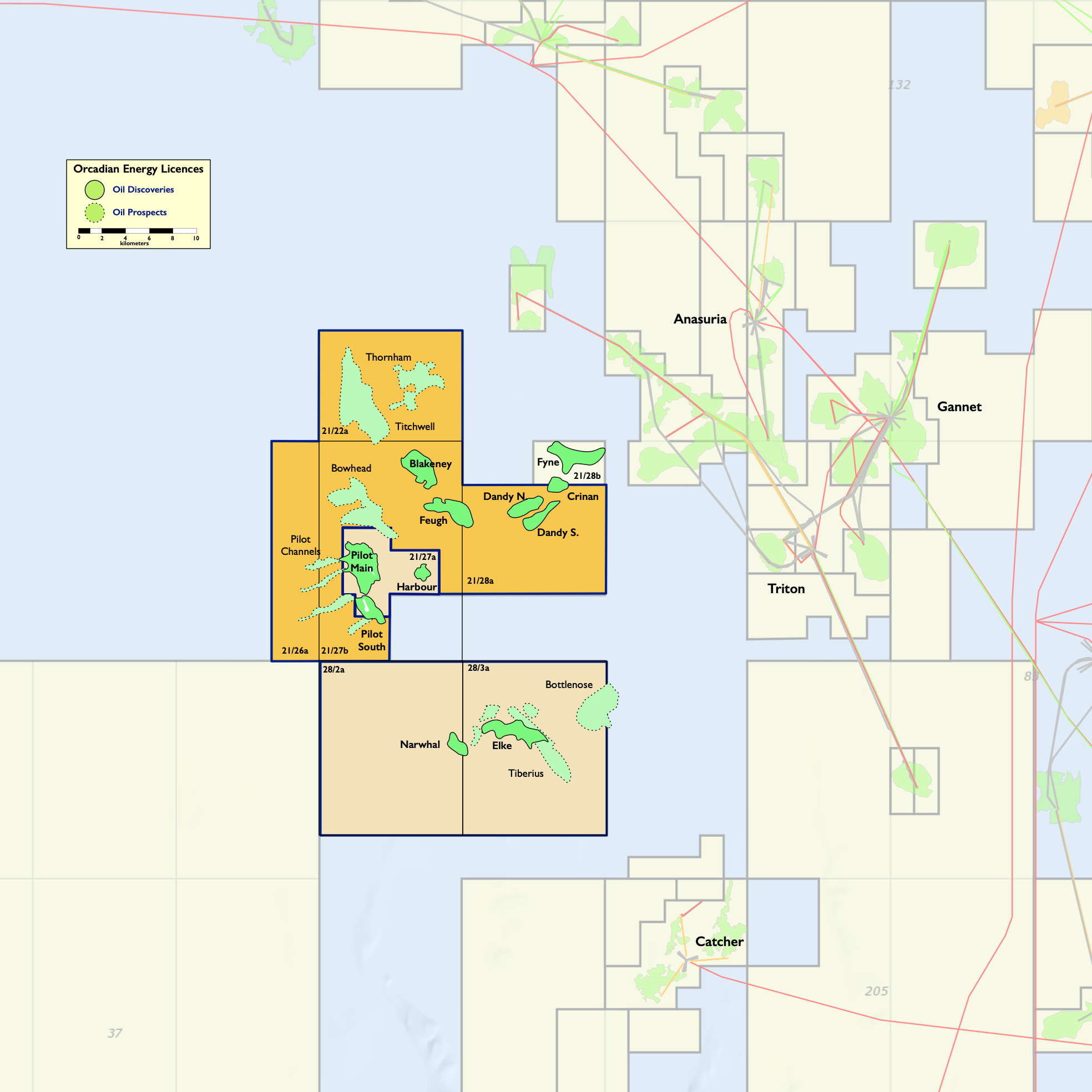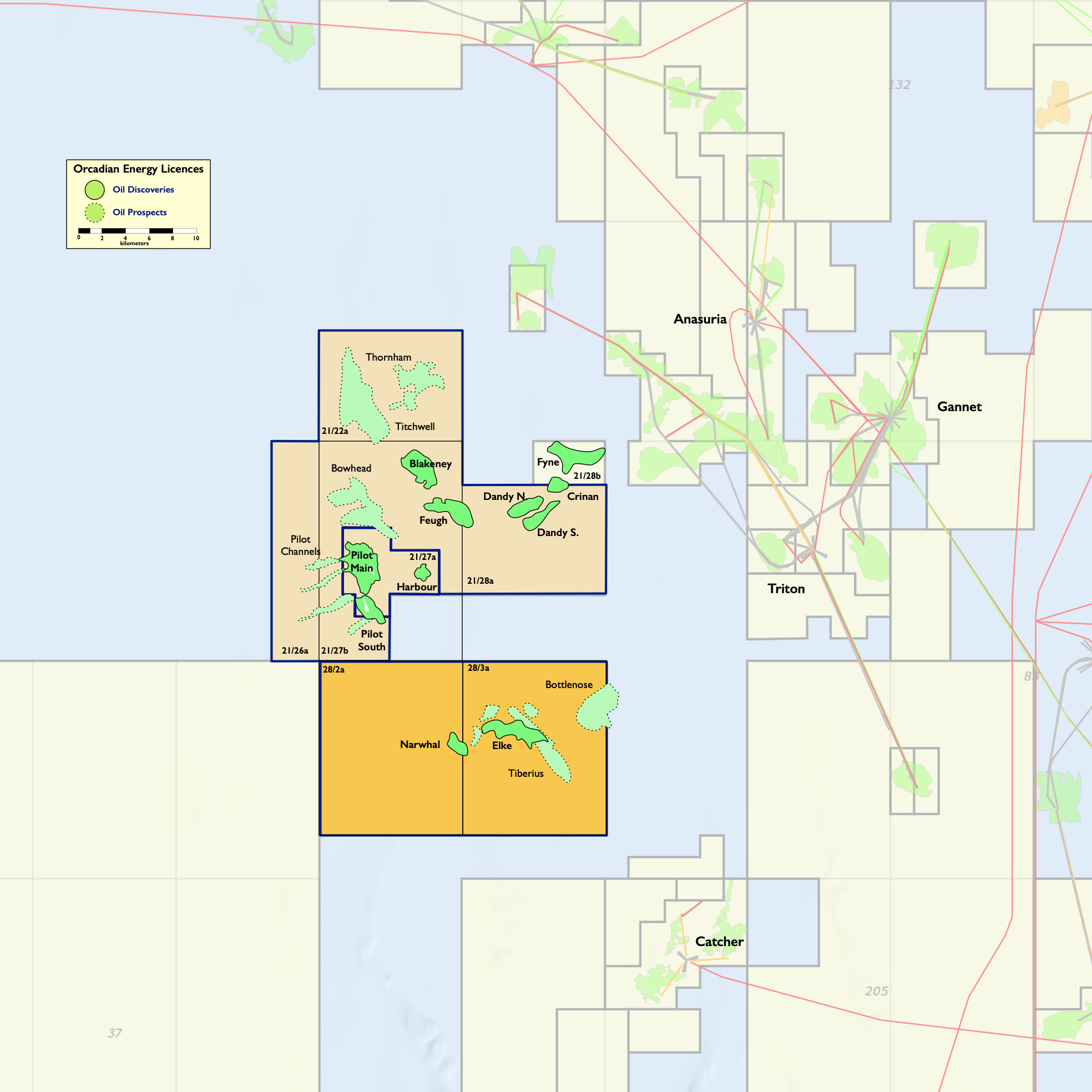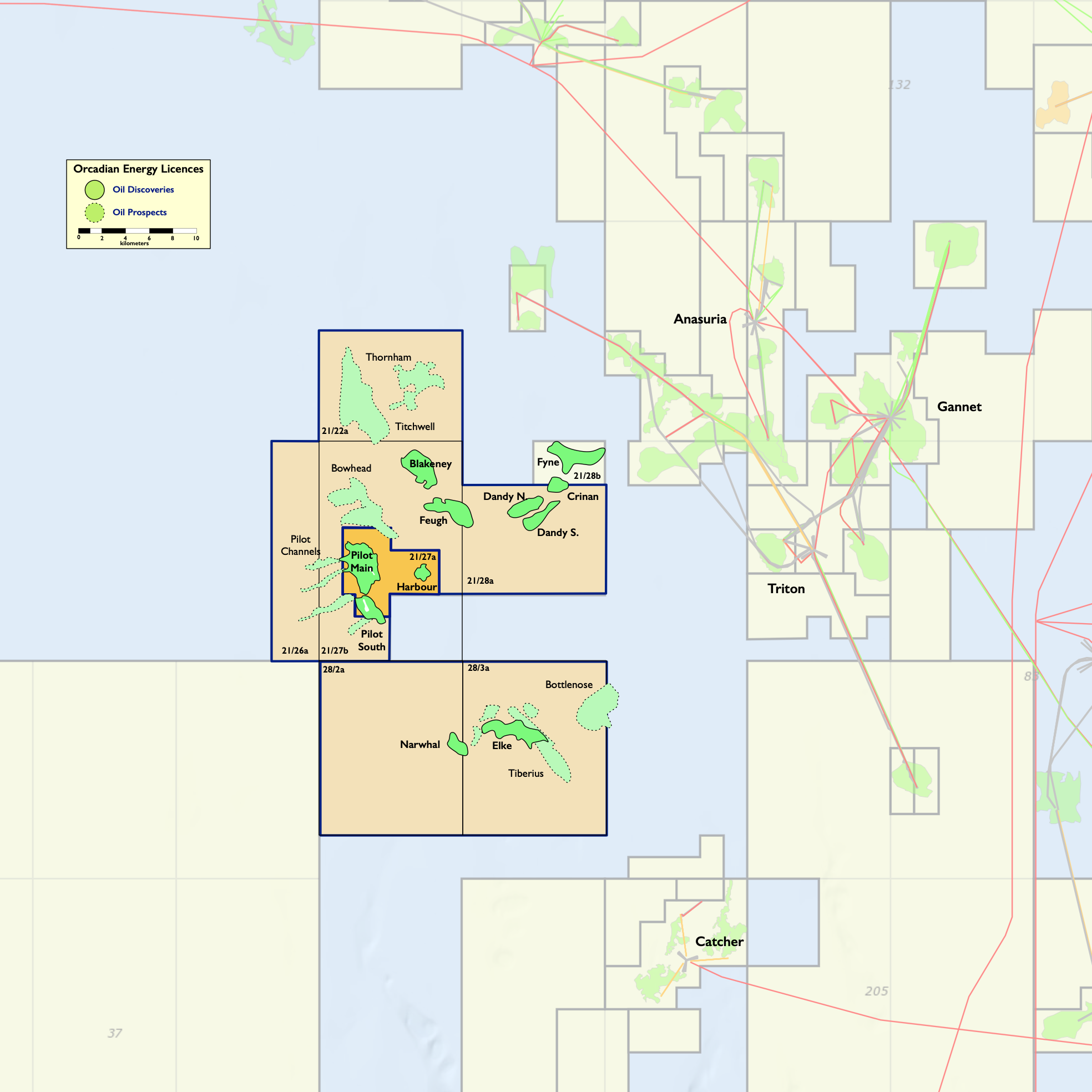30 March 2022
Orcadian Energy plc
(“Orcadian Energy”, “Orcadian” or the “Company”)
UKCS License P2320 – Phase ‘A’ extension and Resource Update
Orcadian Energy (AIM:ORCA), the North Sea focused, low emissions, oil and gas development company, is pleased to announce an extension to Phase ‘A’ of Licence P2320 and a resource update.
Highlights:
- Phase ‘A’ of Licence P2320 extended to 14th May 2023 with the Initial Term also being extended to 14th November 2024
- Company has completed a new interpretation of the recently reprocessed seismic data, licensed from TGS in July 2021
- Company estimates that the development area oil-in-place, for Pilot, will increase by about 10% to 15%, compared to the previously estimated and audited volume
- Directors believe that the increase in development area oil-in-place will likely result in an upgrade to recoverable reserves – when the Company’s reserves are next audited
- Bowhead prospect remains a very exciting opportunity and management now estimates the Geological Chance of Success has increased to 65%
- Company intends to update its CPR this year
Steve Brown, Orcadian’s CEO, said:
“We are delighted to have received this extension from the North Sea Transition Authority (previously known as the OGA), which brings the date by which we are required to commit to drill a well on P2320 into line with our Pilot project FDP approval plans.
“The license extension enables us to implement a development plan for Pilot which will set a new standard for low emissions in the North Sea. The Feugh discovery, located on P2320, allows us to efficiently manage excess gas production; and we are grateful to the North Sea Transition Authority for their support, and agreement to our request for an extension to Phase ‘A’ of the P2320 licence.”
Phase A extension
As described in the Company’s admission document, Phase ‘A’ of Licence P2320 was due to end on the 14th of May 2022. Following extensive discussions with the North Sea Transition Authority (“NSTA”), the regulator has agreed to extend Phase ‘A’ of this Innovate Licence to the 14th May 2023. The Initial Term end date of the License has also been extended until the 14th November 2024.
Licence P2320 makes an important contribution to the reduction in emissions from the planned development of the Pilot field. Orcadian’s preferred means of managing excess gas during the Pilot production phase is to be able to inject it into the gas cap on the Feugh reservoir, which lies within P2320. This eliminates any inessential flaring, and means that there will always be gas available to power the highly efficient gas engines which will provide reserve power capacity when the wind doesn’t blow. A reliable back-up system is the key to maximising the utility of wind power for offshore operations.
Resource Update
The Company has also completed its new interpretation of the recently reprocessed seismic data, licensed from TGS, over the Pilot, Feugh and Blakeney discoveries as well as the Bowhead prospect. For Pilot, the Company estimates that the development area oil-in-place will increase by about 10% to 15% compared to the previously estimated and audited volume, which was based on an older seismic survey. The directors believe that this increase in development area oil-in-place will likely result in an upgrade to recoverable reserves, when the Pilot field reserves are next audited. The development area is the region of the field which the development wells will drain and is referred to in the CPR as the ”Reserves Area”.
The Bowhead prospect remains a very exciting opportunity for the Company. The P90–P50–P10 range for recoverable oil has been revised to 8–44–201 MMbbls, using the same methodology as used in the CPR; the previously estimated range of prospective resources was 12–43–105 MMbbls respectively. Extensive geophysical modelling has shown the seismic response to be consistent with other offset discoveries in the prolific Tay reservoir unit. Management now estimate the Geological Chance of Success for Bowhead to be 65%, previously 49%.
The Company intends to update its CPR during 2022 to reflect this new geological and geophysical interpretation and the encouraging, and ongoing, reservoir modelling work, as well as updated development cost estimates.
Other
To enable Licence P2320 to proceed into Phase ‘C’, the drilling phase, the Company will need to present to NSTA a fully financed proposal for a well to be drilled to the Tay reservoir. That well could be a Bowhead exploration well, a production/injection well on Feugh, an exploration well on the Carra prospect, or potentially an updip appraisal well on the Pilot channels, which are a contiguous part of the Pilot field not included in the current quoted oil-in-place.
In respect of Carra, the Company is now finalising the terms of the previously announced farm-out of a 50% interest in the Carra prospect to Carrick Resources.
For further information on the Company please visit the Company’s website: https://orcadian.energy
The information contained within this announcement is deemed by the Company to constitute inside information as stipulated under the Market Abuse Regulations (EU) No. 596/2014 (MAR). Upon the publication of this announcement via Regulatory Information Service (RIS), this inside information is now considered to be in the public domain.
Contact:
| Orcadian Energy plc | + 44 20 7920 3150 |
|
Steve Brown, CEO Alan Hume, CFO |
|
| WH Ireland (Nomad and Joint Broker) | +44 20 7220 1666 |
|
Harry Ansell / Fraser Marshall (Corporate Broking) Katy Mitchell / Andrew de Andrade (Nomad) |
|
| Shore Capital (Joint Broker) | +44 20 7408 4090 |
|
Toby Gibbs / James O’Neill (Advisory) |
| Tavistock (PR) | + 44 20 7920 3150 |
|
Nick Elwes Simon Hudson Matthew Taylor |
[email protected] |
| Charlesbye (PR) | + 44 7403 050525 |
|
Lee Cain / Lucia Hodgson |
Qualified Person’s Statement
Pursuant to the requirements of the AIM Rules and in particular, the AIM Note for Mining and Oil and Gas Companies, Greg Harding has reviewed and approved the technical information and resource reporting contained in this announcement. Greg has more than 35 years’ experience in the oil & gas industry. He holds a BEng in Chemical Engineering from Imperial College and is a Chartered Engineer, European Engineer, and a member of the Society of Petroleum Engineers, the Energy Institute and the Institute of Chemical Engineers. Greg is Technical Director of Orcadian Energy.
About Orcadian Energy
Orcadian is a North Sea focused, low emissions, oil and gas development company. In planning its Pilot development, Orcadian has selected wind power to transform oil production into a cleaner and greener process. The Pilot project is moving towards approval and will be amongst the lowest carbon emitting oil production facilities in the world, despite being a viscous crude. Orcadian may be a small operator, but it is also nimble, and the Directors believe it has grasped opportunities that have eluded some of the much bigger companies. As we strike a balance between Net Zero and a sustainable energy supply, Orcadian intends to play its part to minimise the cost of Net Zero and to deliver reliable organic energy.
Orcadian Energy (CNS) Ltd (“CNS”), Orcadian’s operating subsidiary, was founded in 2014 and is the sole licensee of P2244, which contains 78.8 MMbbl of 2P Reserves in the Pilot discovery, and of P2320 and P2482, which contain a further 77.8 MMbbl of 2C Contingent Resources in the Elke, Narwhal and Blakeney discoveries (as audited by Sproule, see the CPR in the Company’s Admission Document for more details). Within these licences there are also 191 MMbbl of unrisked Prospective Resources. These licences are in blocks 21/27, 21/28, 28/2 and 28/3, and lie 150 kms due East of Aberdeen. The Company also has a 50% working interest in P2516, which contains the Fynn discoveries. P2516 is administered by the Parkmead Group and covers blocks 14/20g and 15/16g, which lie midway between the Piper and Claymore fields, 180 kms due East of Wick.
Pilot, which is the largest oilfield in Orcadian’s portfolio, was discovered by Fina in 1989 and has been well appraised. In total five wells and two sidetracks were drilled on Pilot, including a relatively short horizontal well which produced over 1,800 bbls/day on test. Orcadian’s proposed low emissions, field development plan for Pilot is based upon a Floating Production Storage and Offloading vessel (FPSO), with over thirty wells to be drilled by a Jack-up rig through a pair of well head platforms and provision of power from a floating wind turbine.
Emissions per barrel produced are expected to be about an eighth of the 2020 North Sea average, and less than half of the lowest emitting oil facility currently operating on the UKCS. On a global basis this places the Pilot field emissions at the low end of the lowest 5% of global oil production.




